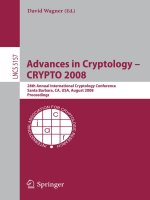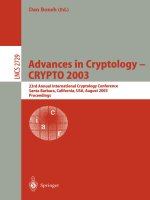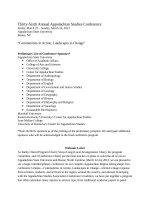15th-annual-pediatric-bioethics-conference-speaker-biographies
Bạn đang xem bản rút gọn của tài liệu. Xem và tải ngay bản đầy đủ của tài liệu tại đây (37.91 KB, 8 trang )
Krysta Barton, PhD, MPH
Dr. Krysta Barton is a clinical research scientist in the Treuman Katz Center for
Pediatric Bioethics and the lead qualitative investigator within the Palliative Care and
Resilience (PCAR) Research program. She is an experienced interdisciplinary
research professional, skilled in qualitative research design, implementation and
analysis, and has a doctoral degree in public health genetics from the University of
Washington as well as an MPH in health education and behavioral science from
Rutgers University. She is a member of the Ethics Committee at Seattle Children’s
Hospital.
Emily Berkman, MD, MA
Dr. Emily Berkman is a physician and bioethicist who is board-certified in pediatrics
and pediatric critical care medicine. She also completed a fellowship in pediatric
bioethics at the Treuman Katz Center, and received a master’s degree in bioethics
from the University of Washington. In addition to her clinical duties, she is a member
of the Ethics Committee and serves as an organizational ethics consultant for Seattle
Children’s Hospital.
Douglas S. Diekema, MD, MPH
Dr. Douglas S. Diekema is the director of education at the Treuman Katz Center for
Pediatric Bioethics. He is a professor in the Division of Bioethics and Palliative Care,
Department of Pediatrics at the University of Washington School of Medicine, and an
adjunct professor in the Departments of Bioethics & Humanities and Internal
Medicine, as well as in the Department of Health Services in the School of Public
Health.
He is also an attending physician in the Emergency Department at Seattle Children’s.
He has been a member of the Seattle Children’s Hospital Ethics Committee since
1991, has served as an ethics consultant since 1993 and is chairperson of the
Institutional Review Board (IRB). He is the former chair of the Committee on
Bioethics of the American Academy of Pediatrics, and continues to serve on that
committee as a liaison from the American Board of Pediatrics. He currently serves on
the board of directors of the American Society of Bioethics and Humanities. He was
honored by the American Academy of Pediatrics as the 2014 recipient of the William
G. Bartholomew Award for Ethical Excellence.
Diekema is the author of numerous scholarly publications on medical ethics and
pediatric emergency medicine. He is the editor of Clinical Ethics in Pediatrics: A
Case-Based Textbook, published by Cambridge University Press.
Norman Fost, MD, MPH
Dr. Norman Fost is a graduate of Princeton (AB 1960), Yale (MD 1964) and Harvard
(MPH 1973). He completed residency training in pediatrics and two years as chief
resident at the Johns Hopkins Hospital. He was a fellow in the Harvard Program in
Law, Medicine and Ethics in 1972–73. Since 1973 he has been at the University of
Wisconsin, where he worked as a general pediatrician for 40 years and is now
professor emeritus of pediatrics and bioethics. He founded the Program in Medical
Ethics in 1973; was chair of the Hospital Ethics Committee for 31 years, and chair of
the Health Sciences IRB for 31 years; was director of the Pediatric Residency
Training Program for 21 years; was founder and director of the Child Protection
Program for 33 years; and was vice chair of the Department of Pediatrics and the
Department of Medical History and Bioethics for 10 years.
He was an elected member of the Princeton University Board of Trustees (1994–
1998) and in 1996–97 was the DeCamp Visiting Professor of Bioethics at Princeton.
He served on the Ethics Working Group of President Clinton’s Health Care Task
Force and in 2003 he received the William G. Bartholomew Award from the
American Academy of Pediatrics for Excellence in Ethics. In 2004 he was awarded
the Nellie Westermann Prize for Research Ethics, and was runner-up in 1976 and
1989. In 2006 he received a lifetime achievement award, created by the U.S. DHHS
Office of Human Research Protection, for excellence in human research protection. In
2007 he was the first recipient of the Patricia Price Browne Award in Bioethics from
the Oklahoma University Medical School. In 2011 he was inducted into the Johns
Hopkins University Society of Scholars, and in 2016 he received the MacLean Prize,
the largest prize in bioethics.
He has published numerous articles on a range of issues in medical ethics, including
human subjects research, genetic screening, performance enhancing drugs, euthanasia
of handicapped newborns, organ transplantation and access to human growth
hormone. He has taught courses on ethical and regulatory issues in human subjects
research at the Food and Drug Administration (FDA), and for 20 years has taught a
similar course at the Johns Hopkins Medical Institutions. He has served on numerous
federal committees and commissions on a variety of ethical and regulatory issues. He
is past-chair of the FDA Pediatric Ethics Subcommittee, and served on the National
Academy of Science Committee on Guidelines for Stem Cell Research.
Fost has been a frequent guest on national television shows, including Nightline,
Frontline, Crossfire, Donahue, The News Hour, Good Morning America, 20/20,
ESPN SportsCenter, HBO, Charlie Rose, Larry King Live and Oprah. He appears in
the movie Bigger, Stronger, Faster, and was a consultant for the 2018 Oscar
documentary winner, Icarus.
Lainie Friedman Ross, MD, PhD
Dr. Lainie Friedman Ross is the Carolyn and Matthew Bucksbaum Professor of
Clinical Medical Ethics; a professor in the Departments of Pediatrics, Medicine,
Surgery and the College; the associate director of the MacLean Center for Clinical
Medical Ethics; and co-director of the Institute for Translational Medicine, all at the
University of Chicago. Ross has published two books on pediatric ethics: Children,
Families and Health Care Decision Making (Oxford University Press, 1998)
and Children in Medical Research: Access Versus Protection (Oxford University
Press, 2006), and has co-authored two books with Robert M. Veatch (Transplantation
Ethics, 2nd edition, Georgetown University Press, 2015; and Defining Death: The
Case for Choice, Georgetown University Press, 2016). She has also published over
200 articles in peer-reviewed journals in the areas of pediatric ethics; transplantation
ethics; research ethics; and genetics and ethics.
She earned her AB from the Woodrow Wilson School of Public and International
Affairs at Princeton University (1982); an MD from the University of Pennsylvania
School of Medicine (1986) and a PhD in philosophy from Yale University (1996). She
did her pediatric residency at the Children’s Hospital of Philadelphia (1986–1988) and
at Columbia University (1988–1989).
She was a 2014 recipient of a John Simon Guggenheim Memorial Foundation
Fellowship and the 2015 recipient of the William Bartholomew Award in Ethical
Excellence from the American Academy of Pediatrics. She currently serves as the
chair of the NIH study section of Societal and Ethical Issues in Research (SEIR), and
is a member of the external expert panel (EEP) of the NIH APOL1 Long-Term
Kidney Transplantation Outcomes Network (APOLLO).
Aviva Goldberg, MD, MA, FRCPC
Dr. Aviva M. Goldberg is a pediatric transplant nephrologist, section head of pediatric
nephrology and associate dean for UGME student affairs at Max Rady College of
Medicine at the University of Manitoba in Winnipeg, Canada. She is a board member
of the Canadian Society of Transplantation and founded its ethics committee. She also
serves/has served on the ethics committees of the International Pediatric Transplant
Association, American Society of Pediatric Nephrology, Canadian Blood Services and
the Royal College of Physicians and Surgeons of Canada.
Goldberg holds a master's degree in bioethics and health policy from Loyola
University Chicago and a fellowship in bioethics and medical humanities from
Northwestern University. She has published and lectured widely on the topics of
transplant ethics and pediatric ethics and is co-editor of the book Ethical Issues in
Pediatric Organ Transplantation, published by Springer.
Jennifer Kett, MD, MA
Dr. Jennifer Kett is a physician and bioethicist who is board-certified in neonatology
as well as hospice and palliative medicine. In addition to neonatology and palliative
medicine fellowships, she also completed a fellowship in pediatric bioethics at the
Treuman Katz Center, and received a master’s degree in bioethics from the University
of Washington.
Kett is currently practicing as a pediatric palliative care physician at Mary Bridge
Children’s Hospital in Tacoma, Washington. She is co-chair of the Ethics Committee
for Mary Bridge and Tacoma General Hospitals.
Jenny Kingsley, MD
Dr. Jenny Kingsley is a current pediatric critical care fellow at Seattle Children’s
Hospital and pediatric bioethics fellow at the Treuman Katz Center. She is also
currently enrolled in the University of Washington, where she is working towards a
master’s degree in bioethics.
Mary Faith Marshall, PhD, HEC-C, FCCM
Dr. Mary Faith Marshall is the Emily Davie and Joseph S. Kornfeld Professor of
Biomedical Ethics; director of the Center for Biomedical Ethics and Humanities; and
director of the Program in Biomedical Ethics at the University of Virginia School of
Medicine. With her colleagues Lois Shepherd and Julia Taylor, she co-founded its
program Studies in Reproductive Ethics and Justice. She is a professor of public
health sciences in the School of Medicine, and a professor in the Schools of Nursing
and Law (University Faculty). She co-chairs the UVA Health System Ethics
Committee and directs its Ethics Consult Service. Her expertise includes reproductive,
clinical and research ethics.
She is past president of the American Society for Bioethics and Humanities (ASBH)
and the American Association for Bioethics. She served on the ASBH Health Care
Ethics Certification Task Force from 2016–2017 and is a member of the inaugural
class of healthcare ethics consultants to be certified by the ASBH (2019). She is an
elected fellow of the American College of Critical Care Medicine, where she is vicechair and forthcoming chair of the SCCM Ethics Committee. In 2017 and 2019 she
received SCCM Presidential Citations for Outstanding Contributions to the Society of
Critical Care Medicine.
Marshall received the Trailblazer Award from the NAACP (Charleston Chapter) in
1999 for her work in policy approaches to perinatal substance use disorder, and has
testified on this subject before Congress and in U.S. district court. She was a member
of the American College of Obstetricians and Gynecologists Committee on Ethics for
11 years, and is the primary author of its Opinion #664, Refusal of Medically
Recommended Treatment During Pregnancy. She is a member of the editorial board
of the American Journal of Bioethics.
Marshall has served on a number of National Institutes of Health boards, including the
NIAID Division of Aids Prevention Africa DSMB and its International DSMB for
Africa. She chaired the first NIH review panel on global health research involving
human subjects. She also chaired the National Human Research Subjects Protections
Advisory Committee at the U.S. Department of Health and Human Services, and has
been a special consultant to the DHHS secretary on research related to children and
prisoners. She was an expert advisor on the Committee on Assessing the System for
Protecting Human Research at the Institute of Medicine.
Marshall received her BA, BSN and PhD from the University of Virginia, where she
was the Paddock Graduate Fellow in Biomedical Ethics. She was a critical care nurse
at UVA for 11 years. Her research interests include moral distress, coercive
interventions in pregnancy, policy approaches to perinatal substance use disorder,
clinical ethics, human subjects protections and research ethics. Marshall is former
associate dean of social medicine and professor of family medicine and community
health at the University of Minnesota (UMN) Medical School, and co-director of the
UMN Center for Bioethics in the Academic Health Center.
Kim Sawyer, MD
Dr. Kim Sawyer is a palliative care pediatrician and ethicist-in-training. She
completed her pediatrics residency and palliative and hospice medicine fellowship at
Baylor College of Medicine. She is currently a pediatric bioethics fellow at the
Treuman Katz Center, and is working toward an MA in bioethics and humanities at
the University of Washington. She practices pediatric palliative care at Seattle
Children’s Hospital, where she is also an ethics consultant and member of the Ethics
Committee.
Maya Scott, MSW, LSWAIC
Maya Scott is a clinical social worker and palliative care consultant currently
practicing at Seattle Children's Hospital. She also provides support to individuals and
families as a grief therapist through the Journey Program at Seattle Children's. With
Journey, her focus is on providing culturally responsive outreach and therapeutic care.
Scott previously worked in the community as a case manager serving medically
fragile foster youth seeking permanency and adoptive placements, and at Seattle
Children’s in the rehabilitation setting. She earned her bachelor's in American Studies
at the University of Hawaii at Manoa and later her master's in social work from the
University of Washington, with a focus on medical social work. She was a Carole
Lamar Scholar and completed additional training in palliative care and oncology.
Robert Truog, MD
Dr. Robert Truog is the Frances Glessner Lee Professor of Medical Ethics,
Anaesthesiology and Pediatrics and director of the Center for Bioethics at Harvard
Medical School. He also practices pediatric intensive care medicine at Boston
Children’s Hospital, where he has served for more than 30 years, including a decade
as chief of the Division of Critical Care Medicine.
Truog received his medical degree from the University of California, Los Angeles,
and is board certified in the practices of pediatrics, anesthesiology and pediatric
critical care medicine. He also holds a master’s degree in Philosophy from Brown
University.
Truog has published more than 300 articles in bioethics and related disciplines. His
books include Talking With Patients and Families About Medical Error: A Guide for
Education and Practice (2010, JHUP, translated into Italian and Japanese),
and Death, Dying and Organ Transplantation (2012, Oxford).
He has received several awards over the years, including the William G. Bartholome
Award from the American Academy of Pediatrics and the Christopher Grenvik
Memorial Award and the Shubin-Weil Master Clinician-Teacher Award, both from
the Society of Critical Care Medicine. In 2013 he was honored with the Spinoza Chair
at the University of Amsterdam.
Elliott M. Weiss, MD, MSME
Dr. Elliott M. Weiss is an assistant professor in the Division of Neonatology at the
University of Washington and faculty at the Treuman Katz Center for Pediatric
Bioethics at Seattle Children’s Hospital. He attends in the neonatal intensive care unit
and on the ethics consult service.
He completed fellowships in neonatology and advanced biomedical ethics at the
University of Pennsylvania, where he also received a master of science in medical
ethics. His areas of research include parental decision-making and communication;
informed consent; neonatal clinical research enrollment; and ethics at the limits of
viability.
Lois Weithorn, PhD, JD
Dr. Lois A. Weithorn is a professor of law and the Harry and Lillian Hastings
Research Chair at the University of California’s Hastings College of the Law. She
received her JD from Stanford Law School, where she served as president of
the Stanford Law Review. After graduating, she clerked for the Honorable Joseph T.
Sneed III of the U.S. Court of Appeals for the Ninth Circuit. Weithorn also has a PhD
in Psychology (University of Pittsburgh). Prior to joining the faculty at UC Hastings,
she held positions at the University of Virginia (Institute of Law, Psychiatry and
Public Policy and Department of Psychology) and served as a fellow at Stanford’s
Center for Advanced Study in the Behavioral Sciences.
Weithorn’s work integrates perspectives in law and the behavioral and health
sciences, with special emphasis on legal policies affecting family relationships or
vulnerable groups such as children and persons with mental disorders. Her scholarship
includes topics such as informed consent, healthcare decision-making capacity and
children’s participation in treatment decisions; legal responses to parental vaccine
refusal; policies affecting youth crossing child welfare, juvenile justice and/or mental
health system boundaries; developmental neuroscience and child protection policy
reform; and legal responses to children’s exposure to domestic violence.
Aaron Wightman, MD, MA
Dr. Aaron Wightman is a pediatric nephrologist and bioethicist at the University of
Washington School of Medicine, Seattle Children’s Hospital and the Treuman Katz
Center for Pediatric Bioethics. His research interests focus on medical decisionmaking for children with complex, chronic medical conditions.
Dominic Wilkinson, MB BS, DPhil
Dr. Dominic Wilkinson is director of medical ethics and professor of medical ethics at
the Oxford Uehiro Centre for Practical Ethics, University of Oxford. He is a
consultant in newborn intensive care at the John Radcliffe Hospital, Oxford. He also
holds a health practitioner research fellowship with the Wellcome Trust and is a
senior research fellow at Jesus College, Oxford.
Wilkinson has published more than 130 academic articles relating to ethical issues in
intensive care for adults, children and newborn infants. He is co-author (with Julian
Savulescu) of Ethics, Conflict and Medical Treatment for Children, From
Disagreement to Dissensus (Elsevier, 2018). He is also the author of Death or
Disability? The ‘Carmentis Machine’ and Decision-Making for Critically Ill
Children (Oxford University Press, 2013) (“the best book of the decade in bioethics...
this is a book that must be read by everybody who is seriously interested in the
bioethical issues that arise in neonatal intensive care or, more generally, in decision
making for children with chronic, debilitating or life-threatening conditions.” [John
Lantos, Notre Dame Philosophical Reviews]). He was editor and associate editor of
the Journal of Medical Ethics from 2011-2018. He is on Twitter at @Neonatalethics.









